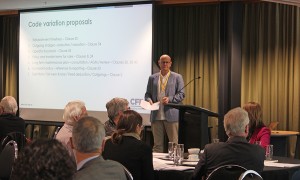CFFC’s annual Retirement Village Stakeholders’ Forum provided an opportunity for free and frank discussion on a variety of issues affecting village operators and residents.
Held in Christchurch on November 26, the forum was the biggest yet with more than 100 attendees, including members of the Retirement Villages Association, the residents’ association, advocacy groups such as Grey Power and Age Concern, government agencies such as the Office for Seniors and Ministry of Housing and Urban Development, and other stakeholders.
Interim Retirement Commissioner Peter Cordtz gave opening and closing addresses, saying housing was becoming increasingly important for those approaching retirement as home ownership declined among all age groups.
“The ability to buy a retirement village’s license to occupy relies on a person having equity in a home they own, but an increasing number of retirees are still renting in retirement. In this year’s Review of Retirement Income Policies we identified this group as vulnerable and are looking at ways they can be supported.”
The Minister responsible for retirement villages, Hon. Kris Faafoi, said the government was committed to reforming tenancy laws. Once this was complete, it would have capacity to review the Retirement Villages Act.
“CFFC is doing a great job of monitoring the effects of this legislation, and it appears there are still issues with some intending residents not understanding the implications of moving into a village. We need to make sure the legislation is still fit for purpose. In the meantime, my officials are working with CFFC on possible variations to the Code of Practice to ensure residents and intending residents are fully informed.
The CEO of Consumer, Sue Chetwin, highlighted how some village contract clauses could be deemed unfair, and the need for operators to take consumer law into account when drafting contracts for intending residents.
CFFC’s National Manager of Retirement Villages, Troy Churton, and Dr Michelle Sullivan, Manager of National Strategy and Performance, discussed the proposed changes to the Code of Practice. Research Analyst Dr Celestyna Galicki discussed complaint reporting data. Residents’ Association Executives Anton Coetzee and Peter Carr shared a legal view of how interpretation of the current Code of Practice could defeat key purposes of the Act. Statutory supervisors discussed new challenges in forecasting financial statements, and Villages association executive director John Collyns went through the proposed disclosure guidelines drafted in response to CFFC’s 2018-19 Monitoring Report, which called for greater clarity of what was involved in the transition from independent living to care facilities in villages.
Churton said he received positive feedback from a range of stakeholders on the value of the forum in bringing people together to share perspectives and ideas on how to make retirement villages operate better for all concerned.